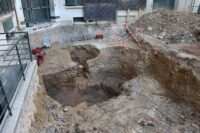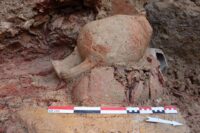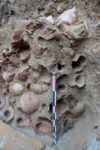 A preventative archaeology excavation in Marseille has unearthed three pits of Greek amphorae dating to the 4th century B.C. Archaeologists have been excavating the site of an office building renovation in a neighborhood of the city that was extensively reconstructed in the second half of the 19th century. A 16th century convent was on the site before then. The Greek-era pit had been absorbed into this much later construction.
A preventative archaeology excavation in Marseille has unearthed three pits of Greek amphorae dating to the 4th century B.C. Archaeologists have been excavating the site of an office building renovation in a neighborhood of the city that was extensively reconstructed in the second half of the 19th century. A 16th century convent was on the site before then. The Greek-era pit had been absorbed into this much later construction.
 The oldest city is what is now France, Marseille was founded as Massalia by colonists from the Ioanian Greek city of Phocaea in around 600 B.C. It was an emporion (trading post) for the burgeoning Ioanian Greek trade networks in the Western Mediterranean. Local production of amphorae and ceramics began virtually immediately to facilitate the transportation, consumption and storage of imported goods like wine and cereals. By the 4th century B.C., Massalia was a power center on the coast of southern Gaul, founding cities from The Pillars of Hercules to Corsica.
The oldest city is what is now France, Marseille was founded as Massalia by colonists from the Ioanian Greek city of Phocaea in around 600 B.C. It was an emporion (trading post) for the burgeoning Ioanian Greek trade networks in the Western Mediterranean. Local production of amphorae and ceramics began virtually immediately to facilitate the transportation, consumption and storage of imported goods like wine and cereals. By the 4th century B.C., Massalia was a power center on the coast of southern Gaul, founding cities from The Pillars of Hercules to Corsica.
 The recent excavation attests to Massalia’s active pottery industry in what was then the periphery of the city. The archaeological team discovered three pits with vertical walls. The first pit was filled with rubble rich in charcoal, clay nodules, kiln fragments and overfired ceramics. This was clearly a reject pit. Pieces from the potters’ workshop, likely located nearby, that failed to meet expectations were tossed into the first pit. The second pit is partially filled with complete Massalian amphorae that were arranged in layers. The third pit was damaged in modern construction and contains ceramic fragments that have yet to be dated.
The recent excavation attests to Massalia’s active pottery industry in what was then the periphery of the city. The archaeological team discovered three pits with vertical walls. The first pit was filled with rubble rich in charcoal, clay nodules, kiln fragments and overfired ceramics. This was clearly a reject pit. Pieces from the potters’ workshop, likely located nearby, that failed to meet expectations were tossed into the first pit. The second pit is partially filled with complete Massalian amphorae that were arranged in layers. The third pit was damaged in modern construction and contains ceramic fragments that have yet to be dated.
The excavation made it possible to collect a large quantity of ceramic furniture, crockery and amphorae, dating homogeneously from the second half of the 4th century B.C. and illustrating the diversity of Massalian productions. The shapes identified correspond mainly to locally made dishes, cups or jugs. Mortars and amphorae also contain a paste rich in mica fragments, typical of Marseille potters’ workshops. Some of these are stamped with Greek letters that increase the body of [known Greek maker’s marks in] the south of France. A few shards of untreated Gallic ceramic as well as Attic imports complete the lot. Fragments of Etruscan, Phoenician-Punic and Iberian amphorae, correspond to older vases, are probably found in a residual position.